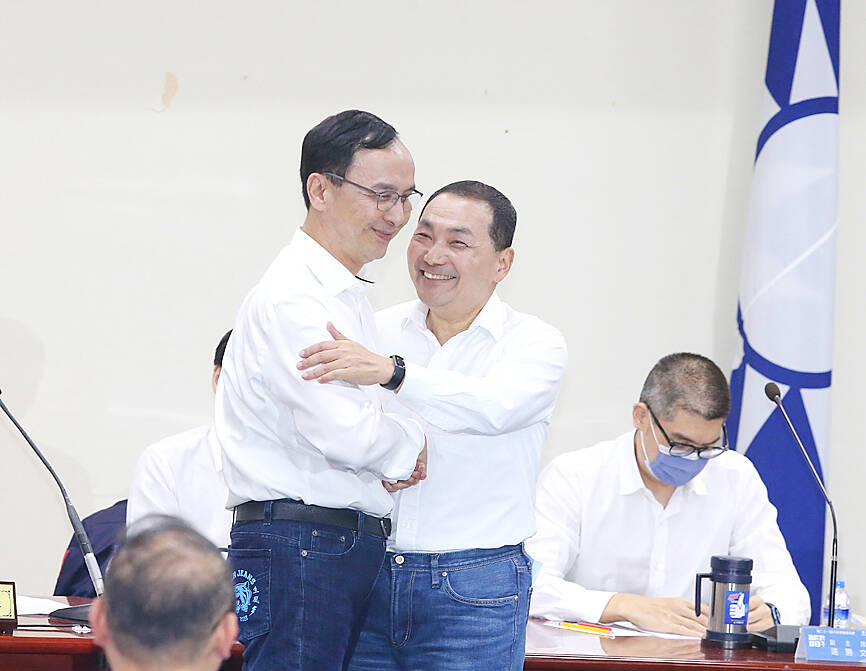New Taipei City Mayor Hou You-yi (侯友宜) yesterday said he is “good to go” to run in next year’s presidential election as the Chinese Nationalist Party (KMT) started its nomination process.
Hou — who is widely regarded as the presumptive KMT presidential candidate — made the remark in response to questions about his next moves at a news conference after a meeting with city officials.
Asked to elaborate, Hou said he has held 15 government posts during his career, adding that preparing for new challenges to help the nation is part of the job.

Photo: CNA
The KMT’s nomination process is directed by KMT Chairman Eric Chu (朱立倫) with an eye toward party unity, Hou said, adding that he trusts in the party headquarters’ decisionmaking process and strategy.
Hou in November last year was re-elected mayor with more than 1.16 million, or 62.42 percent, of the vote, which has bolstered his position as the party’s leading presidential hopeful.
However, to run for president, Hou would need to step down as mayor before serving less than half of his mandate.
Hou said he would like to be part of a special committee that would select candidates for next year’s legislative elections.
Separately, the KMT Central Standing Committee nominated 16 legislative candidates, with KMT mayors and commissioners posing with the candidates for the cameras in a demonstration of unity.
The party would name two more sets of candidates by June 18, KMT Legislator Hung Meng-kai (洪孟楷), who heads the KMT culture and communications committee, told a separate news conference in Taipei.
The party last month said it would nominate legislative candidates by a special committee instead of holding primary elections, citing a need to maintain solidarity.
The party has delayed naming a presidential candidate due not to disunity, but to amplify the “mother hen” effect on other candidates, Hung said.
The KMT would not rush or postpone announcing candidates for the elections, he said.
Asked about Taiwan People’s Party Chairman Ko Wen-je’s (柯文哲) public disapproval of a proposed “non-green alliance,” Hung said the KMT is ironing out differences with other opposition parties in hopes of creating a broader coalition.
The KMT has open lines of communication with other opposition parties and conducts its negotiations with the utmost sincerity, he said.

Alain Robert, known as the "French Spider-Man," praised Alex Honnold as exceptionally well-prepared after the US climber completed a free solo ascent of Taipei 101 yesterday. Robert said Honnold's ascent of the 508m-tall skyscraper in just more than one-and-a-half hours without using safety ropes or equipment was a remarkable achievement. "This is my life," he said in an interview conducted in French, adding that he liked the feeling of being "on the edge of danger." The 63-year-old Frenchman climbed Taipei 101 using ropes in December 2004, taking about four hours to reach the top. On a one-to-10 scale of difficulty, Robert said Taipei 101

Nipah virus infection is to be officially listed as a category 5 notifiable infectious disease in Taiwan in March, while clinical treatment guidelines are being formulated, the Centers for Disease Control (CDC) said yesterday. With Nipah infections being reported in other countries and considering its relatively high fatality rate, the centers on Jan. 16 announced that it would be listed as a notifiable infectious disease to bolster the nation’s systematic early warning system and increase public awareness, the CDC said. Bangladesh reported four fatal cases last year in separate districts, with three linked to raw date palm sap consumption, CDC Epidemic Intelligence

US climber Alex Honnold left Taiwan this morning a day after completing a free-solo ascent of Taipei 101, a feat that drew cheers from onlookers and gained widespread international attention. Honnold yesterday scaled the 101-story skyscraper without a rope or safety harness. The climb — the highest urban free-solo ascent ever attempted — took just more than 90 minutes and was streamed live on Netflix. It was covered by major international news outlets including CNN, the New York Times, the Guardian and the Wall Street Journal. As Honnold prepared to leave Taiwan today, he attracted a crowd when he and his wife, Sanni,

Taiwanese and US defense groups are collaborating to introduce deployable, semi-autonomous manufacturing systems for drones and components in a boost to the nation’s supply chain resilience. Taiwan’s G-Tech Optroelectronics Corp subsidiary GTOC and the US’ Aerkomm Inc on Friday announced an agreement with fellow US-based Firestorm Lab to adopt the latter’s xCell, a technology featuring 3D printers fitted in 6.1m container units. The systems enable aerial platforms and parts to be produced in high volumes from dispersed nodes capable of rapid redeployment, to minimize the risk of enemy strikes and to meet field requirements, they said. Firestorm chief technology officer Ian Muceus said